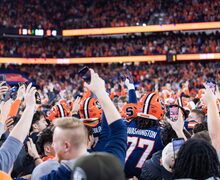SU faculty part of team awarded $11.5 million contract by intelligence services
Zach Barlow | Staff Photographer
Jennifer Stromer-Galley, an SU professor working on the decision-making application, gave a speech in Dineen Hall in Feb. 2016.
A team that includes faculty at Syracuse University is working on an application to help intelligence analysts rely less on mental shortcuts and make better decisions when under pressure.
The researchers, led by Jennifer Stromer-Galley of SU’s School of Information Studies, are creating a web-based program called Trackable Reasoning and Analysis for Collaboration and Evaluation, or TRACE. The program would help people working in agencies like the CIA, the FBI or the National Security Agency avoid reasoning errors, she said.
The team’s research is supported by an $11.5 million contract from the Intelligence Advanced Research Projects Activity, which is an arm of the Office for the Director of National Intelligence, according to an SU News release. It is a 50-month project that involves multiple rounds of experimentation, design and testing, first with individuals and pairs and then with larger groups.
“The goal of the project is to help analysts do their jobs more effectively and more accurately,” Stromer-Galley said.
To do this, the team — which includes researchers from SU, the University of Arizona, Colorado State University and SRC Inc. — is trying to first understand how people reason so they can develop techniques to mitigate the kinds of unconscious mental shortcuts, or “cognitive biases,” that people rely on when they are under pressure.
Rosa Mikeal Martey, an associate professor in the journalism and media communication department at Colorado State who is a co-principle investigator for the study, gave an example of the kinds of cognitive biases the new application is supposed to help analysts avoid.
“Let’s say that you found a house, you love the house,” she said. “… If you only start to pay attention to the newspaper articles or the reports that say, ‘It’s great, it’s the best place to live,’… (and) collect only the stuff that essentially reinforces your own view, that makes you feel good about choosing that house … that’s called confirmation bias.”
The web-based application would first help analysts sort data into different categories and organize their thinking.
“The application could then give the people ‘nudges’ that would prompt them to look at other kinds of evidence or generate alternative hypotheses or consider crowdsourcing a particular part of the job,” said Carsten Oesterlund, an associate professor in the iSchool.
Oesterlund said that crowdsourcing, or pooling the mental resources of lots of people to work on a project, can help reduce the effects of cognitive biases by providing a wide range of different opinions and biases that must compete against each other, so that no one person’s cognitive biases hold sway.
Other team members are working on ways to make the application more user-friendly and enjoyable using some of the principles of computer game development.
“Maybe you have to sort a bunch of candy … It’s kind of a boring task to do, but there’s something about the game that makes it kind of fun,” Martey said. “The kinds of structures and feedback that games use are part of what make them engaging for people. … It’s not that this will be a game, by any means. … but it will use the ideas from game design.”
The researchers said that while their primary client is the intelligence community, they expect that TRACE will adapt well to problems in other fields, such as journalism, medicine and law.
Published on February 19, 2017 at 7:34 pm
Contact Madeleine: mdavison@syr.edu





